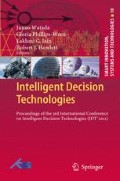Abstract
The attribute coding approach has been used in the Rough Set Theory (RST) based classification problems. The attribute coding defined ranges of the attribute values as multi-thresholds. If attribute values can be defined as appropriate values, the appropriate number of rules will be generated. The attribute coding for the RST based rule derivations significantly reduces unnecessary rules and simplifies the classification results. Therefore, how the appropriate attribute values can be defined will be very critical for rule derivations by using the RST. In this study, the authors intend to introduce the particle swarm optimization (PSO) algorithm to adjust the attribute setting scopes as an optimization problem to derive the most appropriate attribute values in a complex information system. Finally, the efficiency of the proposed method will be benchmarked with other algorithms by using the Fisher’s iris data set. Based on the benchmark results, the simpler rules can be generated and better classification performance can be achieved by using the PSO based attribute coding method.
Access this chapter
Tax calculation will be finalised at checkout
Purchases are for personal use only
Preview
Unable to display preview. Download preview PDF.
References
Aha, D.W., Kibler, D.: Detecting and removing noisy instances from concept de-scriptions, Tecnical Report, University of California, Irvine, 88–12 (1989)
Chang, J.R., Jheng, Y.H.: Optimization of α-cut Value by using Genetic Algorithm for Fuzzy-based rules extraction. In: The 18th National Conference on Fuzzy and Its Applications, pp. 678–683 (2010)
Dasarathy, B.V.: Nosing around the neighborhood: A new system structure and classification rule for recognition in partially exposed environments. PAMI 2-1, 67–71 (1980)
Dimitras, A.I., Slowinski, R., Susmaga, R., Zopounidis, C.: Business failure pre-diction using rough sets. European Journal of Operational Research 114(2), 263–280 (1999)
Hirsh, H.: Incremental version-space merging: a general framework for concept learning, Ph.D. Thesis, Stanford University (1990)
Hong, T.P., Chen, J.B.: Finding relevant attributes and membership functions. Fuzzy Sets and Systems 103(3), 389–404 (1999)
Jackson, A.G., Leclair, S.R., Ohme, M.C., Ziarko, W., Kamhwi, H.A.: Rough sets applied to materials data. ACTA Material 44(11), 4475–4484 (1996)
Jang, J.R., Hung, J.T.: Rough set theory inference to study pavement maintenance, National Science Council Research Project. Mingshin University of Science and Technology, Hsinchu, Taiwan (2005)
Jia, G., Zhang, W.: Using PSO to Reliability Analysis of PC Pipe Pile. In: The 3rd International Symposium on Computational Intelligence, vol. 1, pp. 68– 71 (2010)
Jin, J., Wang, Y., Wang, Q., Yang, B.Q.: The VNP-PSO method for medi-cal image registration.In: The 29th Chinese Control Conference, pp. 5203–5205 (2010)
Kennedy, J., Eberhart, R.C.: Particle Swarm Optimization. In: Proceeding of the IEEE International Conference on Neural Networks, pp. 12–13 (1995)
Khamsawang, S., Wannakarn, P., Jiriwibhakorn, S.: Hybrid PSO-DE for solving the economic dispatch problem with generator constraints. In: 2010 2nd International Conference on Computer and Automation Engineering, vol. 5, pp. 135–139 (2010)
Kim, D.J., Ferrin, D.L., RaghavRao, H.: A study of the effect of consumer trust on consumer expectations and satisfaction: The Korean experience. In: Proceedings of the 5th International Conference on Electronic Commerce, Pittsburgh. ACM International Conference Proceeding Series, pp. 310–315 (2003)
Kondo, Y., Phimmasone, V., Ono, Y., Miyatake, M.: Verification of efficacy of PSO-based MPPT for photovoltaics. In: 2010 International Conference on Electrical Machines and Systems, pp. 593–596 (2010)
Pawlak, Z.: Rough sets. International Journal of Parallel Programming 11(5), 341–356 (1982)
Pawlak, Z.: Rough Sets: Theoretical Aspects of Reasoning about Data. Kluwer Academic Publishing, Dordrecht (1991)
Quinlan, J.R., Compton, P.J., Horn, K.A., Lazarus, L.A.: Inductive knowledge ac-quisition: A case study. In: Quinlan, J.R. (ed.) Applications of Expert systems, Addison-Wesley, Wokingham (1987)
Shyng, J.Y., Wang, F.K., Tzeng, G.H., Wu, K.S.: Rough Set Theory in analyzing the attributes of combination values for the insurance market. Expert Systems with Applications 32(1), 56–64 (2007)
Walczak, B., Massart, D.L.: Tutorial: Rough sets theory. Chemometrics and Intelligent Laboratory Systems 47, 1–17 (1999)
Author information
Authors and Affiliations
Editor information
Editors and Affiliations
Rights and permissions
Copyright information
© 2011 Springer-Verlag Berlin Heidelberg
About this paper
Cite this paper
Chang, JR., Jheng, YH., Lo, CH., Chang, B. (2011). Attribute Coding for the Rough Set Theory Based Rule Simplications by Using the Particle Swarm Optimization Algorithm. In: Watada, J., Phillips-Wren, G., Jain, L.C., Howlett, R.J. (eds) Intelligent Decision Technologies. Smart Innovation, Systems and Technologies, vol 10. Springer, Berlin, Heidelberg. https://doi.org/10.1007/978-3-642-22194-1_39
Download citation
DOI: https://doi.org/10.1007/978-3-642-22194-1_39
Publisher Name: Springer, Berlin, Heidelberg
Print ISBN: 978-3-642-22193-4
Online ISBN: 978-3-642-22194-1
eBook Packages: EngineeringEngineering (R0)

